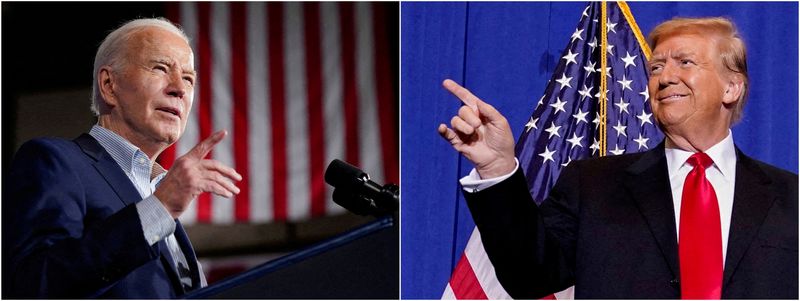Investing.com - Democratic President Joe Biden and Republican former President Donald Trump are set to face each other in the U.S. presidential election on Nov. 5. However, what is expected to be a divisive, and closely fought contest has resulted in uncertainty for the markets.
USA Election 2024
Polling over the last several weeks has shown a close presidential election, with President Biden narrowly but consistently trailing former President Trump in national polling and, more importantly, in the key swing states likely to deliver the marginal electoral votes to the winner.
The first presidential debate injected new uncertainty into the race, with Biden facing widespread criticism for a weak performance, a showing that has prompted calls from some within his own party for him to step aside.
The implied probability that former President Trump will win rose by roughly 6 percentage points in prediction markets during the debate and has risen slightly further since.
The implied odds of a Republican sweep also rose but by less than the move in the presidential race, which is intuitive, as candidate-specific developments at the presidential level are less likely to affect congressional outcomes.
That said, Democratic leaders have rejected calls for a replacement, and no prominent elected Democrat does any better than Biden in a hypothetical matchup against Trump, according to a Reuters/Ipsos poll released in July.
Additionally, Goldman Sachs pointed out, in a note dated July 1, that most recent incumbents lost their first debate, as judged by opinion polls and with an average 3-4 percentage points swing toward the challenger in the poll spread.
The few polls released since last week’s debate show a similar shift.
A second debate is scheduled to be held on Tuesday, Sept. 10, but this would be after the Democratic National Convention is held, on Aug. 19-22, when the party's nominees for president and vice president would be selected.
Key US Government Policy Change Predictions
The recent events may have changed the relative odds of the presidential outcome, but should have more limited implications for control of Congress, Goldman added, with Democrats running well ahead of President Biden in competitive Senate races.
Prediction markets put the odds of a Republican sweep at 49%, up from around 45% just before the debate and 41% a week ago, the investment bank said.
“While the implied odds had already increased noticeably prior to the debate, we would note that the odds of a Republican sweep increased only modestly as a result of the debate, while the odds of a Trump-divided government scenario increased slightly more,” analysts at Goldman said.
This suggests the effect on policy expectations should be concentrated in areas where a potential Trump administration might focus its executive actions, and less in areas that would also require Congress.
The former category includes tariff hikes, immigration restrictions, and an easier environment for regulated industries, including but not limited to antitrust.
However, it would not include things like full extension of the expiring tax cuts or the rollback of green subsidies under the Inflation Reduction Act, which require congressional approval and which Democrats would likely block absent a Republican sweep.
The latter category of items that would be unlikely, absent a Democratic sweep, mainly involve tax hikes on corporate income and high-earning individuals that would go beyond the expiration of the 2017 tax cuts.
US Stock Market Changes In Advance of The Election
The main stock indices on Wall Street have prospered this year, with the broad-based S&P 500 over 15% higher in the first half of 2024, largely supported by top-tier high momentum technology-related stocks.
Markets generally reacted as expected to shifting probabilities of the outcome, with moves higher in equity futures, Treasury yields, and the dollar.
That said, the moves were relatively modest, with S&P 500 Futures rising 0.17% over the course of the debate, implying a modest move of 1.2% in the event of a Trump win.
More interestingly, sectors that might benefit from an easier regulatory environment generally saw relative strength at the open of trading following the debate, which in most cases persisted until the close the following day.
Consumer discretionary, which would face higher tariffs under a Trump administration, and renewables, which could be at risk of losing IRA subsidies, both declined.
Impact of Political Uncertainty
Election-related uncertainty, as measured by the Economic Policy Uncertainty Index, has already been higher this year than usual, and historical patterns and recent events suggest it is likely to rise further over the months ahead.
“While the effects of election-related policy uncertainty are usually fairly modest and there is little empirical relationship between growth and proximity to the election, policy uncertainty in the past has been associated with slower business investment and durable goods consumption,” Goldman added.
How To Stay on Top of The Dollar/Pound Cross
There’s likely to be plenty to keep an eye on as the USD to GBP currency cross movements continue to play out. Thankfully, with the interactive charts and historical currency info available right here on investing.com, investors can keep up with live data.
